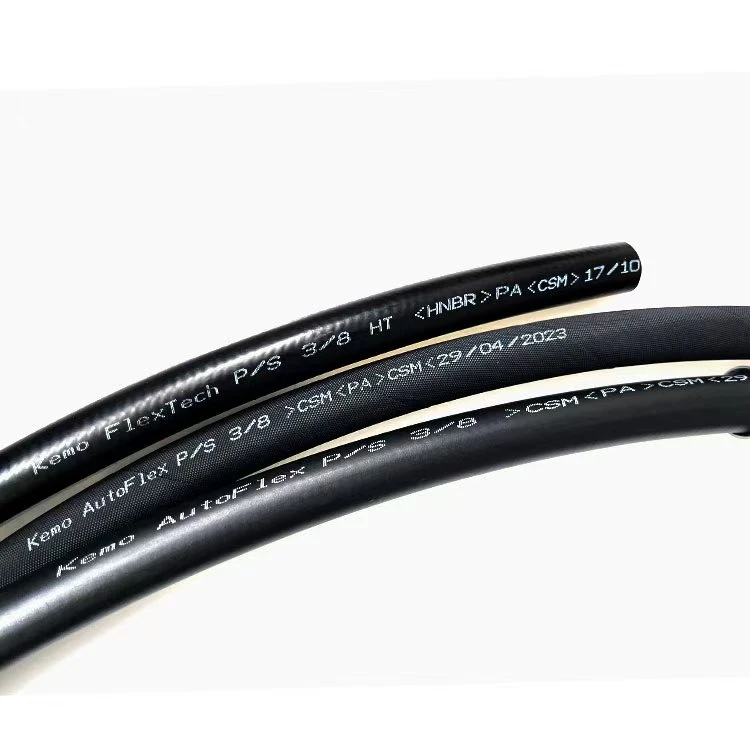diesel fuel line hose
Nov . 30, 2024 20:38 Back to list
diesel fuel line hose
Understanding Diesel Fuel Line Hoses Importance, Types, and Maintenance
Diesel fuel line hoses are critical components in the efficient functioning of a diesel engine. These hoses are responsible for transporting diesel fuel from the tank to the engine, ensuring that fuel delivery is not only efficient but also safe and reliable. Given the aggressive nature of diesel fuel and the operating conditions of diesel engines, understanding the significance, types, and proper maintenance of fuel line hoses is essential for any diesel vehicle owner or operator.
Importance of Diesel Fuel Line Hoses
The fundamental function of diesel fuel line hoses is to transport fuel under varying pressures. The durability and reliability of these hoses are crucial because any failure can lead to fuel leaks, which may result in engine performance issues, environmental hazards, or potential fire hazards. High-quality fuel line hoses prevent contamination of the fuel, maintaining engine performance and longevity.
Moreover, modern diesel engines operate with advanced systems that require precise fuel delivery. This places additional stress on the hoses, making it even more imperative to use high-quality, specialized hoses that can withstand the demands of contemporary diesel engines.
Types of Diesel Fuel Line Hoses
Diesel fuel line hoses come in various types and specifications to suit different applications. The most common types include
1. Rubber Hoses Traditionally, rubber hoses have been widely used for fuel lines due to their flexibility and resistance to various temperatures and fuel types. However, they may degrade over time, especially if exposed to excessive heat or ozone.
2. Polyurethane Hoses These hoses provide a superior level of durability and are often resistant to abrasion and punctures. They can handle a wide temperature range and tend to last longer than conventional rubber hoses.
3. Stainless Steel Braided Hoses For those needing robust protection, stainless steel braided hoses are an excellent choice. They are highly resistant to wear and tear and can withstand high pressures, making them ideal for high-performance diesel applications.
diesel fuel line hose

4. PTFE (Teflon) Hoses These hoses are known for their chemical resistance and ability to handle extreme temperatures. PTFE hoses are excellent for environments where fuel might come into contact with harsh chemicals or high heat.
Maintenance Tips for Diesel Fuel Line Hoses
Proper maintenance of diesel fuel line hoses is essential to ensure their longevity and performance. Here are some practical tips
1. Regular Inspections Routine checks for signs of wear, such as cracks, leaks, or bulges, are essential. Any signs of deterioration should be addressed immediately to prevent more significant issues.
2. Keep Clean Ensure that the area around the hoses is clean and free from debris. Contaminants can lead to fuel system problems, including clogs and reduced efficiency.
3. Avoid High Temperatures High temperatures can cause hoses to degrade more quickly. If possible, ensure that hoses are shielded from excessive heat sources.
4. Proper Installation Ensuring that hoses are installed correctly, following manufacturer specifications, is critical. Incorrect installation can lead to inadequate sealing and increased wear.
5. Use Quality Products Always opt for high-quality hoses designed for diesel fuel applications. Cheaper options may save money upfront but can lead to failures and increased costs in the long run.
In conclusion, diesel fuel line hoses play a pivotal role in the performance and safety of diesel engines. Understanding their importance, types, and maintenance can significantly impact the reliability of the fuel delivery system. By taking proactive measures to maintain the hoses, operators can enhance their diesel engine's performance and longevity while ensuring safe operation. Regular inspections and choosing the right materials are key strategies in fuel line hose management, making them an essential topic for anyone involved in diesel engine operations.
